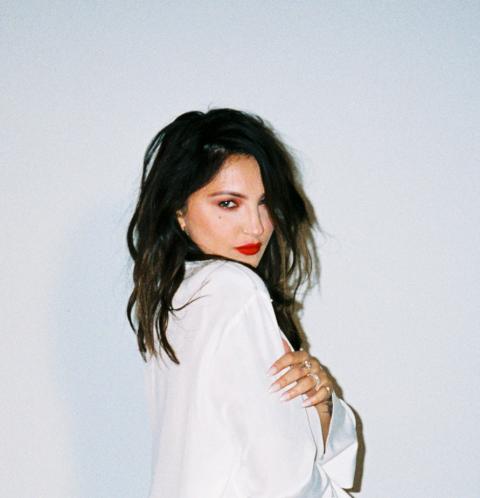Julia Michaels on Mining Her Inner Monologue
2408.jpg)
Julia Michaels
Image by Amaury Nessaibia
Julia Michaels’ success came in two speeds: As a songwriter it built up slowly; as a performer it was almost immediate.
She began writing professionally at the age of 15, after meeting a songwriter that her sister, a vocalist, sang demos for. In the 12 years since that encounter, she’s written hundreds of songs, often with writing partner Justin Tranter B.M. ’01, and many for artists such as Justin Beiber, Gwen Stefani, Dua Lipa, John Legend, and more.
Julia Michaels
Image by Clare Glllen
But it wasn’t until she wrote 2017’s “Issues,” a song she called “the first song that ever felt like me,” that she couldn’t imagine anyone but her performing it. She called an executive she knew at Republic Records and “then all of a sudden, it was just like an overnight situation, and I was singing in front of crowds,” she says.
The song went platinum five times and earned her Grammy nominations in the categories of Best New Artist and Song of the Year.
A couple of weeks ago she received her second Grammy nomination for Song of the Year for “If the World Was Ending,” which she wrote and performed with JP Saxe, who appeared at a virtual Berklee Visiting Artist Series clinic on December 2.
Two days after the Saxe event, Berklee hosted Michaels for a visiting artist clinic, moderated by Grammy-winning singer-songwriter Paula Cole, a visiting scholar in the Voice Department. Below are Michaels’s edited and condensed comments from that clinic.
On Her Songwriting Process
I can't even remember the last time I wrote anything down. I don't. When I did Inner Monologue, a good majority of those songs I wrote in the booth, on the mic—just, like, freestyle.
That's the only way I feel like I can do it because if I write it out then I start to overthink it. If I just sing it down, then my subconscious sort of takes over.
I write a lot of things in my head. If I'm in the room with someone I’ll tell them to play chords, and then I just sort of write it down in my head.
On Coming Up with Concepts for Songs
I don't have to be prepared for every scenario. I can go in and be like, “I have no idea what we should write about,” and then, all of a sudden, someone will say a word or a sentence, and you're like, “That! That's what we're doing today.’
On Writer’s Block
If you don't feel inspired one day, that's fine. The expectation to make a great song every day will actually kill you. So if you're feeling uninspired, go do something that makes you feel inspired.
On Success as a Songwriter
It definitely didn't happen overnight. You gotta go through the songwriter boot camp. You have to write with a lot of people. You gotta write a lot of shitty songs before you can write a couple great ones.
On Dealing with Fame
I'm not on social media lot because that will f***ing break you down. It's unfortunate because it's a necessary evil sometimes, but I personally try not to be on social media very much.
Her Advice for Songwriters
A lot of the times, when people first start out with music they think they have to make what's on trend, and then by the time they've made what's on trend that trend has shifted. So I think the best thing that you can do is just make what you want to hear on the radio.
